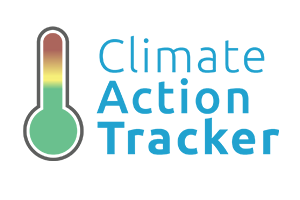The 25th Conference of Parties of the UNFCCC will take place from December 2-13 2019. NewClimate Institute will be present in Madrid hosting and participating in multiple events. Additionally, we will release several related publications before and during COP. You can find all information about it here.
Events & Appearances
Events with NewClimate Institute participation:
Side event: High expectations – Did the UN Climate Action Summit achieve higher climate ambitions? (NewClimate-Event)This session will compare the outcomes of the Global Climate Action Summit in September to the expectations that were raised beforehand, and include a debate on the extent to which the Summit has raised the ambition of countries, what that means for emission reductions and what urgent other steps countries should take.Organiser: Climate transparency, UNEP DTU Partnership, NewClimate InstituteSpeakers: Takeshi Kuramochi (NewClimate), Anne Olhoff (UNEP DTU Partnership), Gerd Leipold (Climate transparency), Fabby Tumiwa (IESR, Indonesia)
View presentation
Side event: Making Article 6 more than zero sum: Options for how to use international carbon markets to enhance ambitionExpert panelists will give their views regarding the question: What are some impactful/feasible ways that Article 6 negotiators can write that last chapter of the Paris rulebook to ensure that international carbon markets are an engine for ambition?Organiser: WWFSpeakers: various, incl. Carsten Warnecke and Aki Kachi (both NewClimate)
Side event: Informing the revision of NDCs: What can long-term strategies bring to NDCs? (NewClimate-Event)This session seeks to review how long-term strategies (LTS) inform NDCs and influence near-term measures and investments consistent with a deep decarbonisation of the economy.Organiser: Institut du Développement Durable et des Relations Internationales (IDDRI), NewClimate InstituteSpeakers: various, incl. Frauke Röser (NewClimate)View presentation
Side event: The Emissions Gap and NDC enhancement (NewClimate-Event)This event will present the latest findings from this year’s UNEP Emissions Gap Report, and will lay out options for how countries can help close the gap by stepping up the ambition of their NDCs. Speakers will offer guidance on opportunities for NDC enhancement in key sectors, such as forests, power, and transport.Organiser: World Resources Institute, PBL Netherlands Environmental Assessment Agency, NewClimate InstituteSpeakers: Takeshi Kuramochi (NewClimate), Anne Olhoff (UNEP DTU Partnership), Michel den Elzen (PBL), Taryn Fransen (World Resources Institute)
Side event: The Emissions Gap Report 2019 – The emissions gap and options for bridging itThe event presents the latest trends in GHGs and progress towards achieving the NDCs, while updating the 'emissions gap', the gap between countries’ pledges and the reductions required for meeting the 1.5C and 2C targets. Then it presents opportunities for enhancing mitigation ambition of G20 members, strategies for transformations toward zero carbon development pathways, policy options for clean transition of the energy systems; and mitigation potentials of material efficiency.Organiser: German Environment Agency (UBA), co-organised with UNEP DTU PartnershipSpeakers: various, incl. Takeshi Kuramochi and Niklas Höhne (both NewClimate)Emissions Gap Report 2019
Side event: Sustainable development impacts under Article 6 (NewClimate-Event)Projects that reduce GHG often have SD impacts which are important for the voluntary market but also have significant potential for SDGs in Paris based market approaches. The informed use of SD indicators and safeguards has the potential to improve effective implementation of SD benefits through transparency and efficient quantification.Organiser: Umwelt Bundesamt, NewClimate InstituteModerator: Carsten Warnecke, Founding Partner, NewClimate InstitutePresenters and respondents: Frauke Röser (Founding Partner, NewClimate Institute), Sarah Leugers (Director, Communications, Gold Standard), Erika Lennon (Senior Attorney, Center for International Environmental Law CIEL), Aki Kachi (Climate Policy Analyst, NewClimate Institute), Sven Braden (Independent Consultant), Comments from Negotiators
Side event: Laying the Foundation for an Inclusive Global Stocktake: Independent Data, Transparency and AnalysisOrganiser: ClimateWorks Foundation, Center for International Forestry Research (CIFOR)Speakers: various, incl. Louise Jeffery (NewClimate)
Side event: Achieving net zero: Opportunities to close the gap to 1.5°C in Europe and beyond (NewClimate-Event)This side event presents the latest research by the Climate Action Tracker, including case studies on how countries can develop Paris compatible policies, enhanced NDCs, and LTS, and a new framework to assess climate governance. The event will also explore how carbon pricing instruments can be designed to enhance political and social acceptance, ensuring a fair distribution of both the burden and benefits of the policy, with effects beyond emissions reductions.Organisers: Climate Analytics, Adelphi, NewClimate Institute, ClimateWorks FoundationSpeakers: Claire Stockwell (Climate Analytics), Louise Jeffery (NewClimate), Swithin Lui (NewClimate), Andreas Geiges (Climate Analytics), Paola Parra (Climate Analytics), Niklas Höhne (NewClimate), Bill Hare (Climate Analytics), Casey Cronin (ClimateWorks Foundation) and country representatives (tbc)Climate Action TrackerView presentation
Side event: From data to policy: Unlocking the power of indexes for Sustainable Development and Climate ActionIn the first part of this event, index developers explain how they use their aggregated metrics to derive powerful messages and attract attention to the issue at stake. In the following panel discussion, the potential of data and indexes to support policymaking and monitor progress on sustainable development and climate action are explored and reflected on, with a focus on the local level.Organisers: European Commission, European Committee of the RegionsSpeakers: various, incl. Niklas Höhne (NewClimate) Side event: Scaling Up Climate Action in TurkeyIn this event, the Climate Action Tracker launches its Turkey-analysis from the "Scaling Up Climate Action" series, followed by a panel discussion on key opportunities for transitioning to a zero emissions society.Organiser: WWF Turkey, Climate Action TrackerSpeakers: various, including Niklas Höhne (NewClimate)
Side event: NDC ambition-raising through integrated national and sectoral planning in Mongolia and Georgia (NewClimate-Event)Mongolia and Georgia have intensively worked on revising their NDCs. The NDC revision process contributed to an increased awareness among relevant decision-makers and stakeholders on integration of climate mitigation and adaptation efforts into development policy and planning. The session aims to present the Georgian and Mongolian experiences and lessons learnt from their NDC revision based on close coordination and alignment with planning processes.Organiser: Government of Mongolia, Government of Georgia, Deutsche Gesellschaft für Internationale Zusammenarbeit GIZ, NewClimate InstituteSpeakers: Thomas Day (NewClimate), Ilka Starrost (GIZ), Kakhaberi Mdivani (Ministry of Environmental Protection and Agriculture, Georgia), Ministry of Environment and Tourism, MongoliaTo the project page
Press conference: Climate Change Performance Index – presentation of results (NewClimate-Event)In this press conference, we present the latest results of the Climate Change Performance Index. The index aims to encourage countries which have, up to now, failed to take ambitious actions on climate protection as well as to highlight countries with best-practice climate policies. The index evaluates and compares the climate protection performance of the 58 largest emitters of GHG emissions globally and has been published annually since 2006.Organiser: Germanwatch, Climate Action Network CAN, NewClimate InstituteSpeakers: various, including Niklas Höhne (NewClimate) and Jan Burck (Germanwatch)View webcast recording
Press conference: Climate Action Tracker – presentation of the latest developments (NewClimate-Event)In this press conference, we will present the updated country assessments, and a briefing paper that summarises the most crucial developments. We also welcome participants from outside of media, but please note that journalists will get to ask questions first.Organiser: Climate Action Tracker (Climate Analytics, NewClimate Institute)Speakers: Niklas Höhne (NewClimate), Bill Hare (Climate Analytics), others tbaCAT homepageView webcast recording Side event: The Emissions Gap Report 2019: Key Findings and Ways ForwardKey findings from the Emissions Gap Report 2019 are presented, followed by a debate on opportunities to enhance mitigation ambition of the new and updated NDCs in 2020, and to accelerate action.Organiser: United Nations Environment Programme UNEP, United Nations Framework Convention on Climate Change UNFCCCSpeakers: various, incl. Niklas Höhne (NewClimate)View webcast recording
Side event: NDCs, the Paris Agreement and the Sustainable Development Goals: Tracking progress and finding synergies (NewClimate-Event)This side-event presents the collaborative work of more than 20 national institutions from various countries worldwide on the latest quantitative assessments of projected GHG emissions pathways and key energy indicators for major emitting countries.Organiser: PBL Netherlands Environmental Assessment Agency, International Institute for Applied Systems Analysis IIASA, NewClimate InstituteSpeakers: various, incl. Niklas Höhne (NewClimate) Side event: Power system transformation – From technical challenges to proactive policymaking (NewClimate-Event)The side event will discuss technical challenges and effective technical and policy options around the integration of variable renewable energy (VRE). A panel discussion with country experts will present challenges and opportunities in each country, facilitating interactions and exchange of experience.Organiser: International Energy Agency IEA, NewClimate InstituteSpeakers: Ditte Jul Jørgensen (EU Commission), David Turk (IEA), Marie-Jeanne Kurdziel (NewClimate), Wang Zhongying (ERI) and othersAccompanying documents
Side event: Pathways to a sustainable future: governance of CO2 removal & mitigation strategies for industryThis side event will examine the key role for CO2 Capture and Storage in large-scale emission reductions and removals, and will focus on pathways to low carbon cement and steel in Latin America.Organiser: Carnegie Climate Governance Initiative (C2G), CO2Geonet, ImplementaSurSpeakers: various, incl. Niklas Höhne (NewClimate) Side event: Closing the gap - Efforts to increase ambition in all Parties’ NDCs and the role of forests in coming closer to the overall Paris targetIn this event, the panelists will discuss efforts to increase ambition in all countries’ NDCs, and the role of forests and the land use sector in the process of achieving the overall Paris target.Organiser: European ParliamentSpeakers: Markus Hagemann (NewClimate), Bas Eickhout (Chair of the European Parliament delegation to COP25), Frans Timmermans (European Commission), Elizabeth May (MP, leader of the Green Party of Canada), and more
Side event: Aligning operations of Multilateral Development Banks with the Paris Agreement (NewClimate-Event)At COP25, the multilateral development banks (MDBs) will present a framework to align their financial flows with the objectives of the Paris Agreement. What does the ‘alignment of financial flows’ mean, how can it be put into practice and drive the demand of economies into climate-resilient and carbon-neutral development? We will present science-based recommendation for an ambitious implementation of development banks' alignment with the Paris Agreement.Organiser: Germanwatch, World Resources Institute, NewClimate InstituteSpeakers: Markus Hagemann (NewClimate), Ingrid Hoven (BMZ), MDB representatives (tbc), David Ryfish (Germanwatch), Lauren Sidner (WRI) Side event: Future role of carbon markets in facilitating voluntary climate actions The cancellations of emission reduction credits in voluntary markets and of allowances in compliance markets can enable voluntary climate action. The event will present the interim results of two projects, one comparing credit and allowance cancellations along key dimensions and the other focusing on the role for voluntary markets post-2020.Organiser: Adelphi, The Öko-InstitutSpeakers: various, incl. Harry Fearnehough (NewClimate)
Side event: Accelerating energy transitions and raising ambition based on decreasing costs of renewables The event will present new analyses of energy transitions towards decarbonisation and raising ambition of NDCs based on the lower cost projections, including analyses for countries in East Asia and Latin America. Implications will be discussed with practitioners from the case study countries.Organiser: Fraunhofer Institute for Systems and Innovation Research (FhG ISI), Renewable Energy InstituteSpeakers: various, incl. Leonardo Nascimento (NewClimate)To the project page Related Publications
Publications related to the COP25:
Find all NewClimate's publications here
Carbon markets:
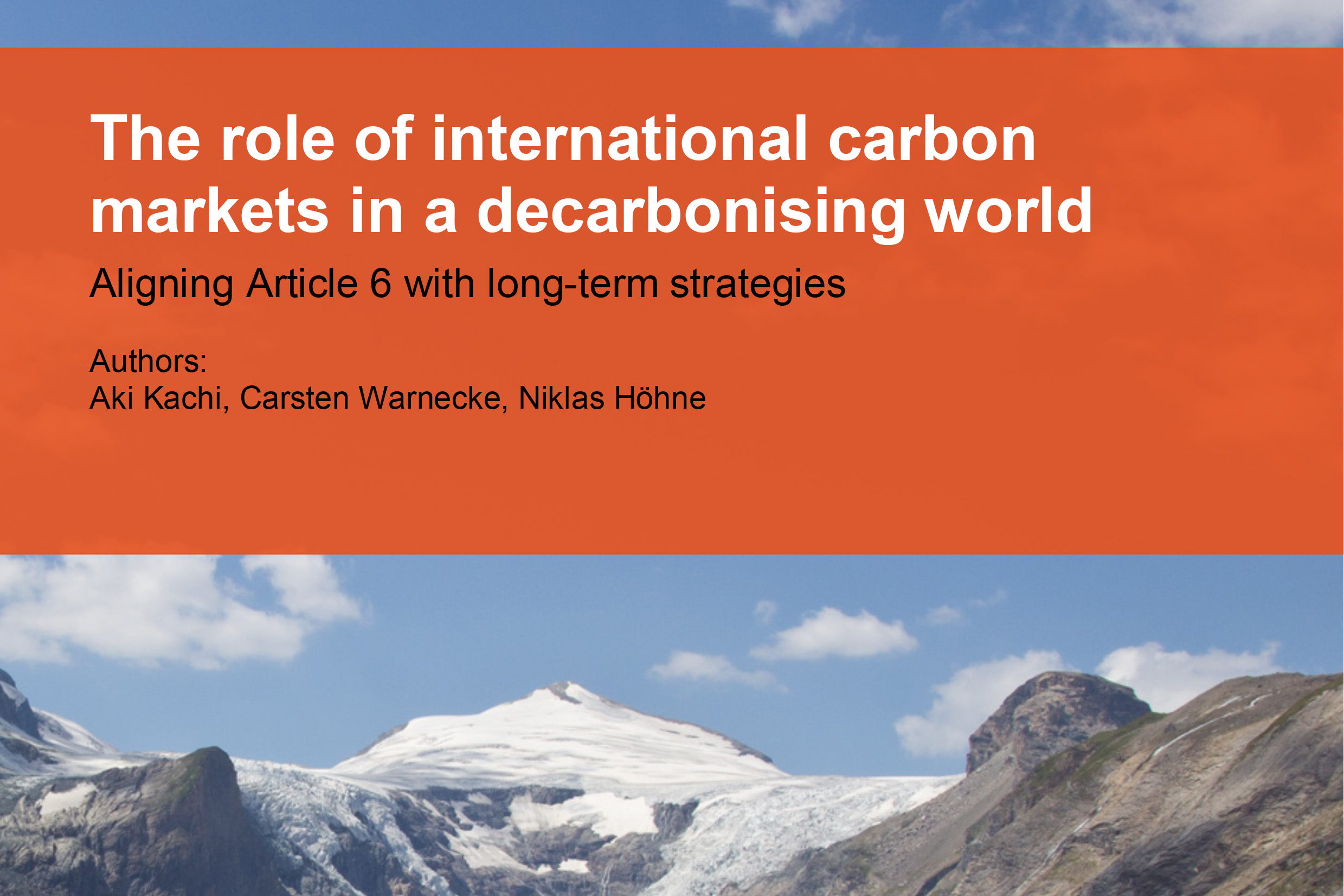 The role of international carbon markets in a decarbonising worldA growing number of countries have started to set longer-term climate targets and develop decarbonisation strategies in addition to their shorter-term commitments under the Paris Agreement. Depending on the country, offsets in the form of emission reductions or emission removals from abroad play various roles in how countries sketch out future planning. In the context of constantly ratcheted up ambition of national climate efforts under the Paris Agreement however, the role that such offsets can play requires a shift from the current practice of offsetting continued emissions trends to rapidly avoiding and reducing all emissions possible and going still further to draw carbon out of the atmosphere. In this paper, we explore the new context and discuss what it means for both potential buying and selling countries on the way to a net-zero and net-negative carbon world.To the report
The role of international carbon markets in a decarbonising worldA growing number of countries have started to set longer-term climate targets and develop decarbonisation strategies in addition to their shorter-term commitments under the Paris Agreement. Depending on the country, offsets in the form of emission reductions or emission removals from abroad play various roles in how countries sketch out future planning. In the context of constantly ratcheted up ambition of national climate efforts under the Paris Agreement however, the role that such offsets can play requires a shift from the current practice of offsetting continued emissions trends to rapidly avoiding and reducing all emissions possible and going still further to draw carbon out of the atmosphere. In this paper, we explore the new context and discuss what it means for both potential buying and selling countries on the way to a net-zero and net-negative carbon world.To the report
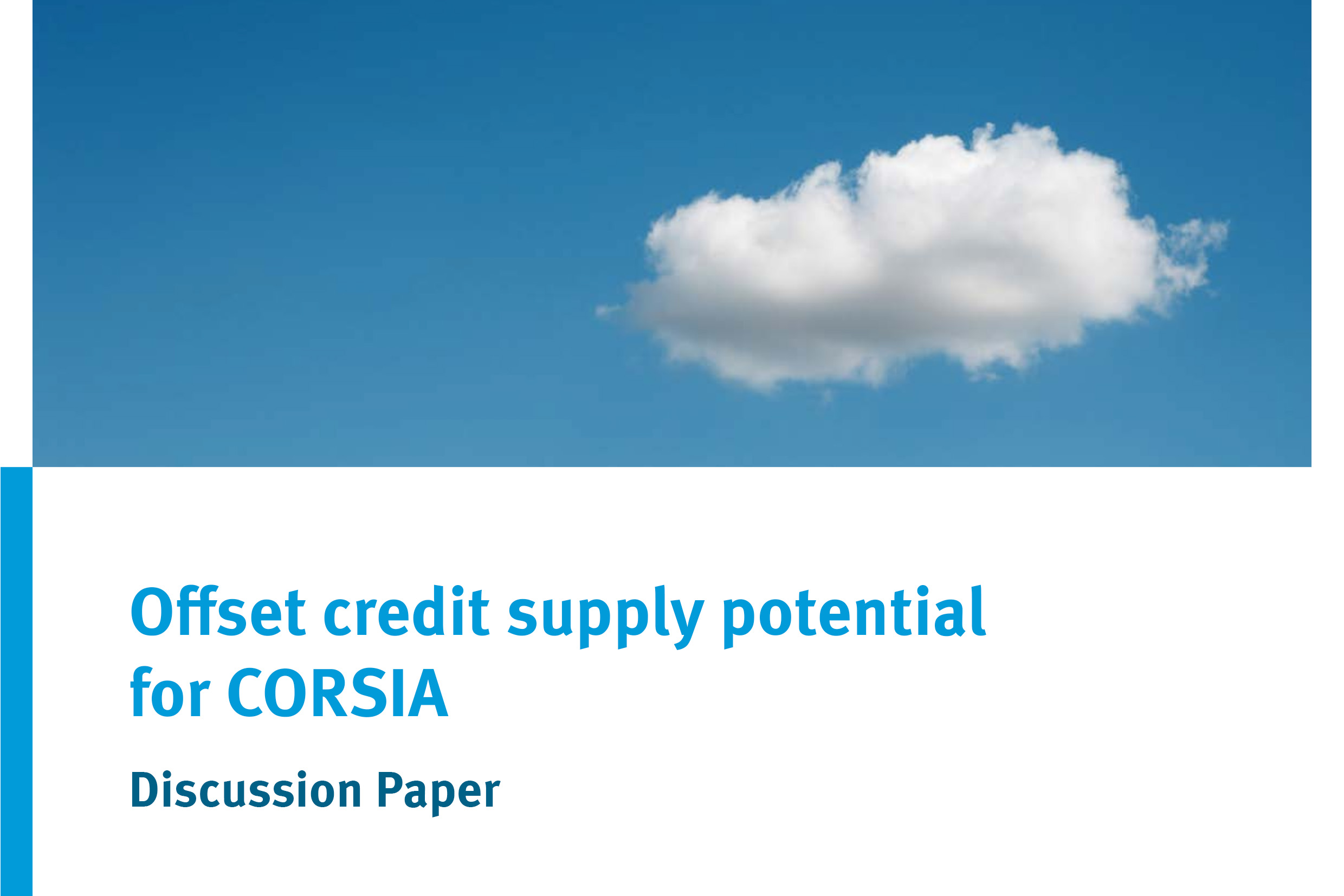 Offset credit supply potential for CORSIAIn this discussion paper we estimate the marginal cost of supplying certified emissions reduction units (CERs) from projects that are currently registered under the Clean Development Mechanism (CDM). We develop a supply curve using data on the individual ability of projects to potentially supply CERs over the period up to 2020. We analyse changes to the supply curve based on a number of scenarios which restrict the eligibility of CERs based on the timing of emission reductions, the timing of project investment decisions and registration under the CDM, as well as an assessment of the extent to which projects are vulnerable to the risk of discontinuing abatement activities without CER revenues.To the paper How could the concept of an “overall mitigation in global emissions” (OMGE) be operationalized under the Paris Agreement? (Frequently asked questions)This paper addresses questions that have been raised in relation to OMGE. It draws on a study conducted by Lambert Schneider and NewClimate Institute.To the blogpost
Offset credit supply potential for CORSIAIn this discussion paper we estimate the marginal cost of supplying certified emissions reduction units (CERs) from projects that are currently registered under the Clean Development Mechanism (CDM). We develop a supply curve using data on the individual ability of projects to potentially supply CERs over the period up to 2020. We analyse changes to the supply curve based on a number of scenarios which restrict the eligibility of CERs based on the timing of emission reductions, the timing of project investment decisions and registration under the CDM, as well as an assessment of the extent to which projects are vulnerable to the risk of discontinuing abatement activities without CER revenues.To the paper How could the concept of an “overall mitigation in global emissions” (OMGE) be operationalized under the Paris Agreement? (Frequently asked questions)This paper addresses questions that have been raised in relation to OMGE. It draws on a study conducted by Lambert Schneider and NewClimate Institute.To the blogpost
Serious issues in the negotiations on international carbon markets (Article 6) must be addressed to avoid undermining the Paris AgreementIn this blogpost, the NewClimate markets team provided recommendations for the then imminent SB50 negotiations to guarantee that Article 6 ensures its mandate to promote ambition and avoid undermining global climate efforts. The findings are still very relevant for COP25.To the blogpost
Climate and development:
NDC Update Report December 2019 – Long-term, society-wide visions for immediate actionThe NDC Update Report tracks the progress on the implementation of Nationally Determined Contributions (NDCs) to the Paris Agreement. The theme of this report is the role of long-term low greenhouse gas emission development strategies (LTSs) in achieving the Paris Agreement goal. This report argues for the importance of developing long-term (sector) strategies to determine the highest possible ambition for the coming NDC update (until 2030) and to signal a clear path for future NDC ambition raising (towards net-zero in 2050). Governments can use the NDC update to signal that indeed the highest possible ambition needs to lead to decarbonisation by 2050 or shortly thereafter.To the report
Recent outputs:
- Transition Towards a Decarbonised Electricity Sector - A Framework of Analysis for Power System Transformation
- The role of geothermal and coal in Kenya’s electricity sector and implications for sustainable development
- The role of renewable energy mini-grids in Kenya’s electricity sector
Tools and Models developed under Ambition to Action:
- Economic Impact Model (EIM): The model can be used to quantify employment and economic impacts of enhanced renewable energy scenarios and is being applied in various country contexts.
- Air Pollution Impact Model (AIRPOLIM): The model allows for the quantification of health impacts of fossil fuel based power plants (coal and gas). In future this will also include health impacts from transport activities.
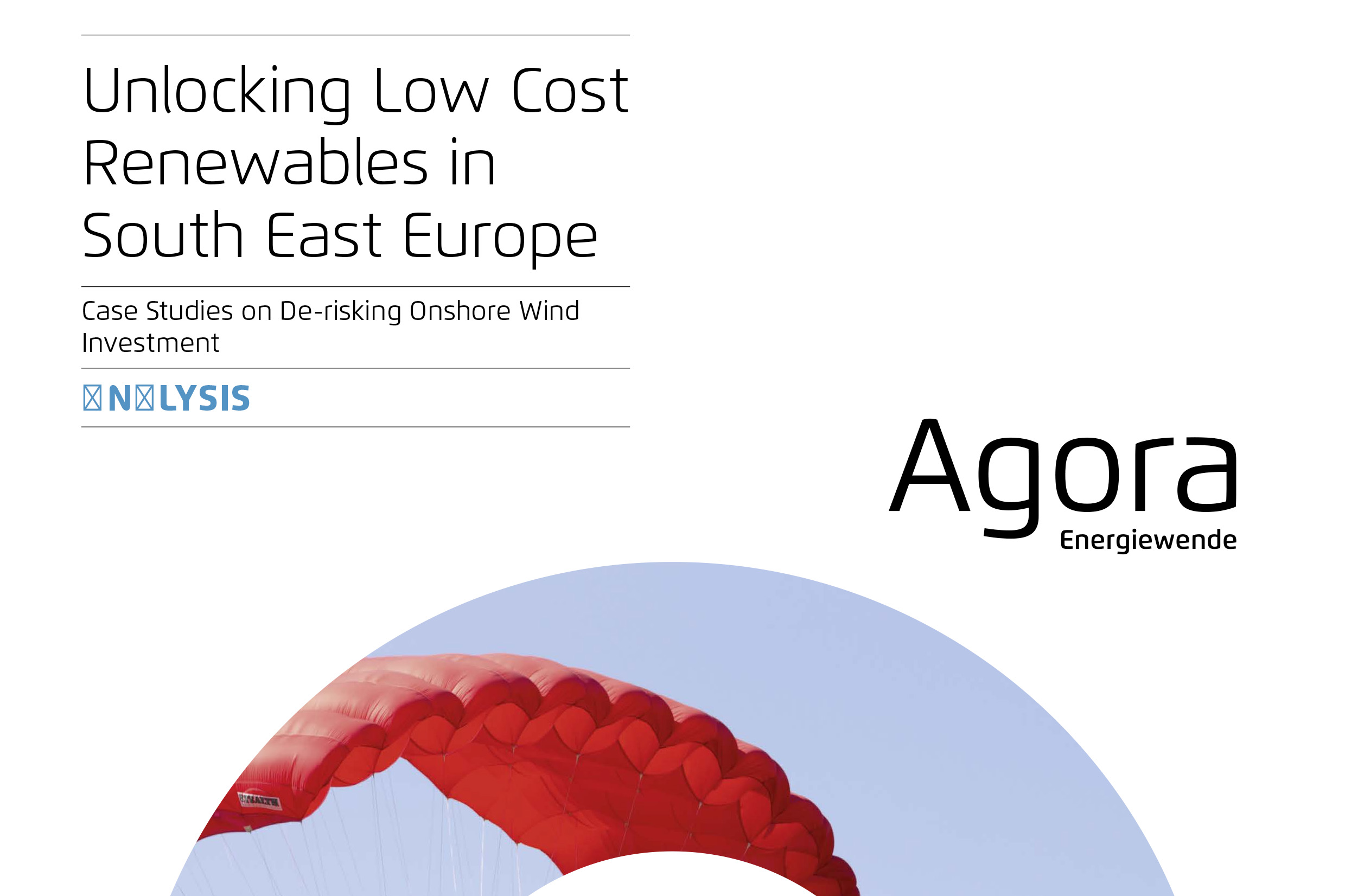 Unlocking Low Cost Renewables in South East EuropeThis report explores how various political and financial measures could help to “de-risk” renewables investment using onshore wind investments in Serbia and Greece as case examples.To the report
Unlocking Low Cost Renewables in South East EuropeThis report explores how various political and financial measures could help to “de-risk” renewables investment using onshore wind investments in Serbia and Greece as case examples.To the report
A ten point agenda for delivering higher mitigation ambitionThe paper formulates 10 points for mitigation ambition and includes recommendations on ways to support ambition raising through international cooperation.To the report
Saving time and resources by aligning climate planning processesThis blogpost shows how countries could consolidate multiple climate change planning processes and international climate commitments into one single process, ensuring efficiency and alignment.To the blogpost
Tracking countries' climate actions:
Greenhouse gas mitigation scenarios for major emitting countries – Analysis of current climate policies and mitigation commitments: 2019 UpdateThis report by NewClimate Institute, PBL Netherlands Environmental Assessment Agency and the International Institute for Applied Systems Analysis (IIASA) provides an overview of projected greenhouse gas (GHG) emissions in 25 major emitting countries/regions up to 2030, taking into account the emission trajectories based on current policies and the implementation of nationally determined contributions (NDCs). The report concludes that 12 out of the 25 countries and regions analysed are not on track to achieve the NDC targets they have set for themselves. This report updates the 2018 report, and for the first time presents additional key indicators next to greenhouse gas emissions.To the report
The Climate Change Performance Index 2020Developed by NewClimate Institute, Germanwatch and CAN, the index ties in with the global Climate Change Performance Index by Germanwatch, a rating of the 58 largest emitters of GHG emissions globally that has been published annually since 2006.To the report
Assessment of the potentials to increase emissions reduction targets by the major GHGs emitters taking into consideration technological and political feasibility This report shows the potential distribution of the emissions reduction efforts between different Parties based on different approaches and presents an in-depth assessment of the circumstances influencing the (over-) achievement of the currently suggested emissions reduction goals. The analysis focuses on the following countries: Brazil, Canada, China, Germany, India, Japan and the United States.To the report
Fairness- and Cost-Effectiveness-Based Approaches to Effort-Sharing under the Paris AgreementThis report shows national GHG emissions reductions for 2030 and 2050 that are consistent with the Paris Agreements’ long-term temperature goal, both based on fairness and cost-effectiveness approaches. The range of fair shares was derived from an evaluation of a broad spectrum of fairness-based approaches by the Climate Action Tracker. The cost-effective reduction shares are based on recent marginal abatement cost curves, which were used to derive globally cost-effective national pathways.To the report
Tackling the Challenges of Assessing Collective Progress for an Effective Global StocktakeThis summary report creates a framework to evaluate if a GST is successful and formulates recommendations for the design of the GST process. Please note that this is the executive summary of the full report that was published in advance to already feed into the negotiations at COP25. The main document will be provided subsequently.To the report
Guiding questions for the Global Stocktake under the Paris Agreement - What we know and what we don’tThe independent Global Stocktake (iGST) seeks to increase the accuracy, transparency, accountability, and relevance of the official Global Stocktake benchmarking process by bringing together independent researchers and advocates. In this paper, build on previous work, we aim to identify knowledge gaps as well as potential areas of focus for a successful GST to take place.To the report
Special report series:
- Climate Governance Assessment Series:This memo series provides guidance on how major emitting sectors can achieve the rapid transformations required to meet the Paris Agreement temperature goal. CAT Governance project page
- Scaling Up Climate Action: This report series considers options for countries to move their emissions towards a Paris Agreement compatible pathway and achieve significant benefits. The most recent reports cover Argentina, Australia, Indonesia and Turkey and their actions for electricity production, urban passenger transport, and residential buildings. CAT Scaling up project page
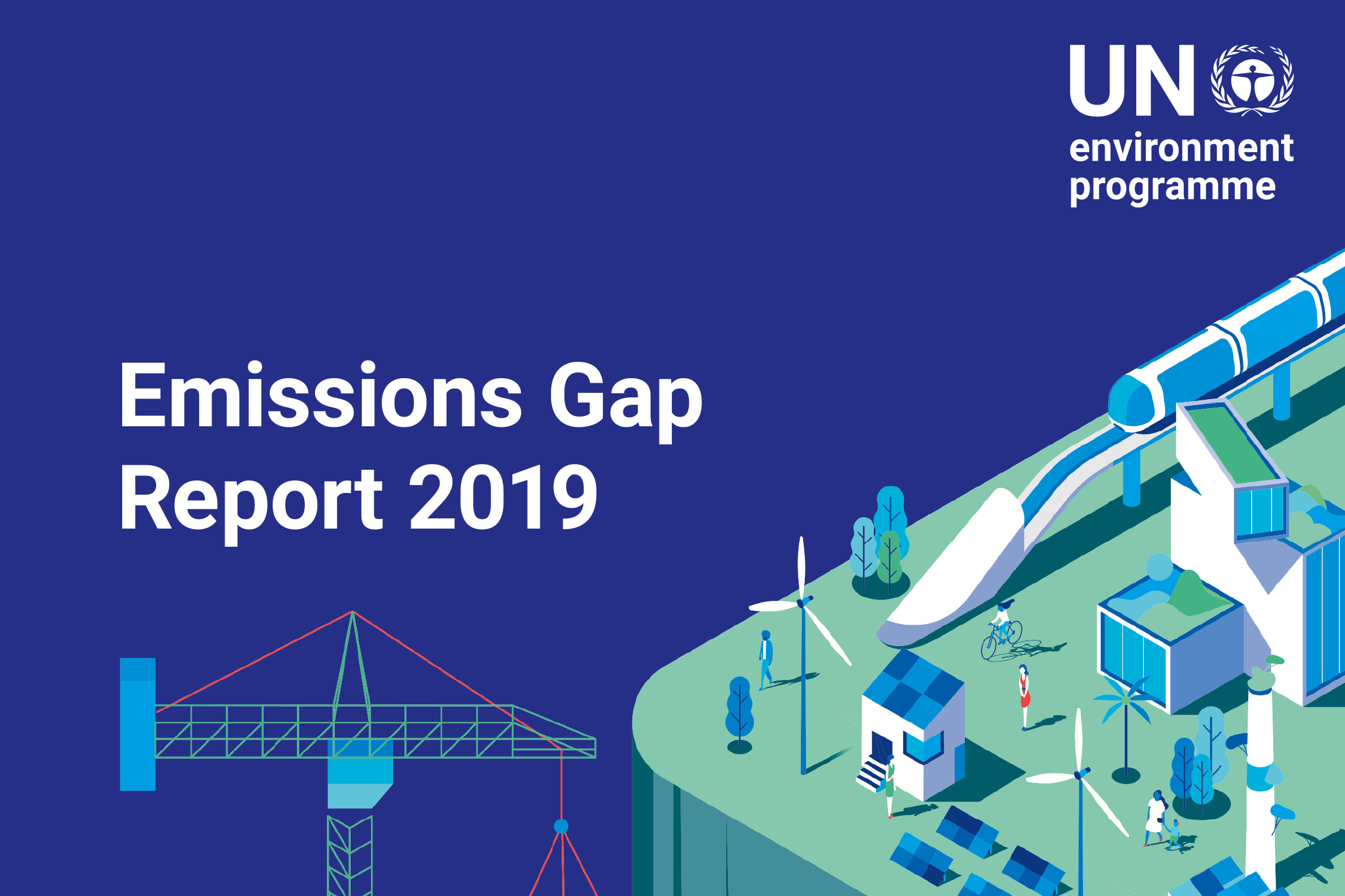 The Emissions Gap Report 2019: A UN Environment Synthesis ReportThis is the tenth edition of the United Nations Environment Programme (UNEP) Emissions Gap Report. It provides the latest assessment of scientific studies on current and estimated future greenhouse gas (GHG) emissions and compares these with the emission levels permissible for the world to progress on a least-cost pathway to achieve the goals of the Paris Agreement. This difference between “where we are likely to be and where we need to be” has become known as the ‘emissions gap’.To the UNEP websiteTo the latest report
The Emissions Gap Report 2019: A UN Environment Synthesis ReportThis is the tenth edition of the United Nations Environment Programme (UNEP) Emissions Gap Report. It provides the latest assessment of scientific studies on current and estimated future greenhouse gas (GHG) emissions and compares these with the emission levels permissible for the world to progress on a least-cost pathway to achieve the goals of the Paris Agreement. This difference between “where we are likely to be and where we need to be” has become known as the ‘emissions gap’.To the UNEP websiteTo the latest report
Global climate action from cities, regions and businesses – 2019This report is the second global analysis of local and regional government and corporate climate contributions, updating “Global Climate Action from Cities, Regions, and Companies” launched at the 2018 Global Climate Action Summit. The 2018 report established the strong potential of subnational and non-state actors to help avoid climate change. This year, we aim to inform the September 2019 UN Climate Action Summit on how mitigation by cities, regions and companies could help national governments boost their ambition beyond their current targets, to come in line with the Paris Agreement’s goals.To the report
A possible 2050 climate target for the EUThis study assesses the EU’s 2050 target, i.e. halving global emissions by 2050 to be in line with 2°C, in today’s setting to evaluate if the target, which was set ten years ago, is still appropriate and/or sufficient. It offers recommendations for the EU to aim for more ambitious targets.To the report
Climate finance:
Raising the Game on Paris Alignment – Six Memos on the Multilateral Development Banks’ Paris Alignment ApproachThis discussion paper provides six separate memos on the building blocks of Paris alignment introduced by the Multilateral Development Banks. The memos provide suggestions on how to design different tools for a robust framework for Paris alignment.To the report About this COP
Key topics from NewClimate's perspective:
Also this year NewClimate Institute will be participating in the UNFCCC climate negotiations and contributes to the conference with reports and other publications:
- How big is the climate action gap? Sadly, the climate action gap is as big as never before. A team of international scientists, including NewClimate experts, has compiled this for the tenth time now in the “UNEP Emissions Gap Report”. But there is a silver lining: agile countries, regions, cities and businesses take a lead role by alredy implementing the radical, but necessary changes.
- Will new national proposals on climate protection close the yawning gap? Which countries have improved their policies since Paris? Are the countries on track to meet their targets? Are new proposals better than previous ones? Regular updates on 36 countries are available on the Climate Action Tracker – press conference in Madrid on Tuesday, 10 December, 11 a.m.
- What could be rules for a new international carbon market? A last chapter of the rulebook to the Paris Agreement has not been agreed upon yet: the international carbon markets. The devil is in the details as explained in a NewClimate Blogpost. The goals of the Paris Agreement ask countries to develop and implement long term strategies that include the fastest technically feasible decarbonisation pathway. Therefore a new role of offsets needs to deviate from the current practice to not undermine the ambitions and meanings of net zero targets. Furthermore, it’s important how international aviation (NewClimate output) and shipping (paper with different options) can be included. Without strict eligibility criteria, the mechanisms for compensation in international aviation may not have any impact.
- How can climate protection and development be combined? In Kenia, for example, small, stand-alone renewable energy systems – mini-grids – can not only bring power to remote areas, but also drive the general development. In south-eastern Europe, proper finance instruments can significantly decrease the risks for investments in wind power. And having a look at neighbouring countries’ approaches can support the energy transition.
For questions or further discussion, meet us at one of our events, or contact us as follows:
- Niklas Höhne on international climate protection: +49 1737152279, @email, on site from 4 until 11 December
- Carsten Warnecke on international carbon markets: +49 151 68 400100, @email, on site from 2 until 7 December
- Frauke Röser on climate and development: +49 151 6840 9310, [email protected], on site from 3 until 8. December

